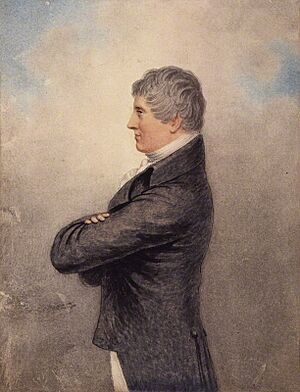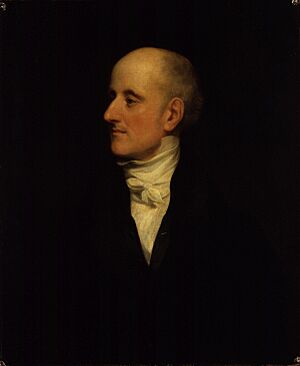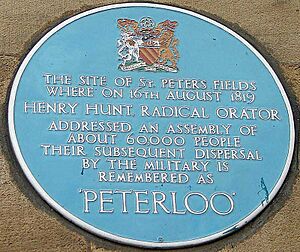Henry Hunt (politician) facts for kids
Quick facts for kids
Henry Hunt
|
|
|---|---|

Portrait by Adam Buck, c. 1810
|
|
| Member of Parliament for Preston |
|
| In office 1830–1833 |
|
| Preceded by | Hon. Edward Smith-Stanley |
| Succeeded by | Peter Hesketh-Fleetwood |
| Personal details | |
| Political party | Radical |
Henry "Orator" Hunt (born November 6, 1773 – died February 13, 1835) was an important British speaker and activist. He is remembered as a leader in the movement for working-class rights. He also greatly influenced the later Chartist movement.
Hunt strongly supported changing the parliament. He also wanted to get rid of the Corn Laws, which made food expensive. In 1832, he was the first Member of Parliament to speak up for women's right to vote. He presented a request to parliament from a woman asking for this right.
Contents
Early Life and Beginnings in Politics
Henry Hunt was born on November 6, 1773, in Upavon, a town in Wiltshire, England. He grew up to become a successful farmer.
Hunt first got involved in politics during the Napoleonic Wars. He became a supporter of Francis Burdett, another important political figure.

Hunt became known for his great public speaking skills. He spoke out in Bristol against both the Whigs and the Tories. He felt they were not doing enough for ordinary people. Instead, he supported a more democratic approach to politics. Thanks to his special talents, new ideas for change slowly gained support after the war with France ended.
Becoming "The Orator"
After giving powerful speeches at large meetings in Spa Fields in London in 1816, Henry Hunt earned the nickname "The Orator." This name was given to him by the writer Robert Southey.
Hunt believed in a program that included annual parliaments and universal suffrage. This meant having elections every year and giving everyone the right to vote. He promoted these ideas openly. He did not use secret methods like older political groups. His main strategy was to use "mass pressure." He believed that if enough people showed their support, changes could happen without needing a rebellion.
His efforts to involve many people in politics helped to make large parts of the community more interested in change. These were people who did not have a voice in Parliament.
The Peterloo Massacre
On August 16, 1819, Henry Hunt was invited to speak at a large rally in Manchester. This event was organized by the Patriotic Union Society. However, the rally turned into a terrible event known as the Peterloo massacre.
Hunt was arrested after the Peterloo event. He was accused of serious charges related to his speeches. He was found guilty of a lesser charge of trying to stir up trouble. He was sentenced to 30 months in Ilchester Gaol prison. For the government and business leaders, Hunt's ideas were seen as a threat. He believed in equal rights, universal suffrage (everyone voting), parliamentary reform, and ending child labor.
The Peterloo event, caused by the authorities' strong reaction, made Hunt even more famous. While in prison, Hunt started writing to share his ideas. He wrote an autobiography and other works.
After he was released from prison, he tried to start new businesses in London. One of his ideas was a roasted corn "Breakfast Powder." He also made shoe-blacking bottles that had a slogan: "Equal Laws, Equal Rights, Annual Parliaments, Universal Suffrage, and the Ballot." He even tried to make artificial coal for the French market.
Time in Parliament
Even with his business ventures, Hunt remained active in politics. He continued to fight for various issues and pushed for reform and accountability. In 1830, he became a Member of Parliament for Preston. He won against Edward Stanley, who later became a British Prime Minister.
However, Hunt lost his seat when he ran for re-election in 1833. He was a strong supporter of the working classes. He often used this term to describe the people he represented. He disagreed with the Whigs and the Reform Act 1832. He felt the Reform Act did not go far enough to give more people the right to vote.
Hunt gave speeches specifically to the "Working Classes." He encouraged them to push for full equal rights. In 1832, he presented the first request to Parliament asking for women's right to vote. Sadly, this request was met with laughter and opposition.
In his fight against the Reform Bill, Hunt brought back the Great Northern Union. This was a group he had started years before. Its goal was to unite workers in the northern industrial areas. They wanted full democratic reform. This is how his ideas influenced the Chartism movement, which later fought for similar goals.
Death and Legacy
Henry Hunt's health began to decline in 1834. In early 1835, he had a severe stroke in Alresford, Hampshire. He died on February 13, 1835. He was buried at Parham Park, Sussex.
In 1842, "the working people" built a monument to Henry Hunt in Manchester. It was located in Scholefield's Chapel Yard on Every Street. People would march past the Peterloo site to the monument on the anniversary of the Peterloo Massacre. Over time, the monument's stone wore down, and it was taken down in 1888.
See also
 In Spanish: Henry Hunt para niños
In Spanish: Henry Hunt para niños
 | Dorothy Vaughan |
 | Charles Henry Turner |
 | Hildrus Poindexter |
 | Henry Cecil McBay |


